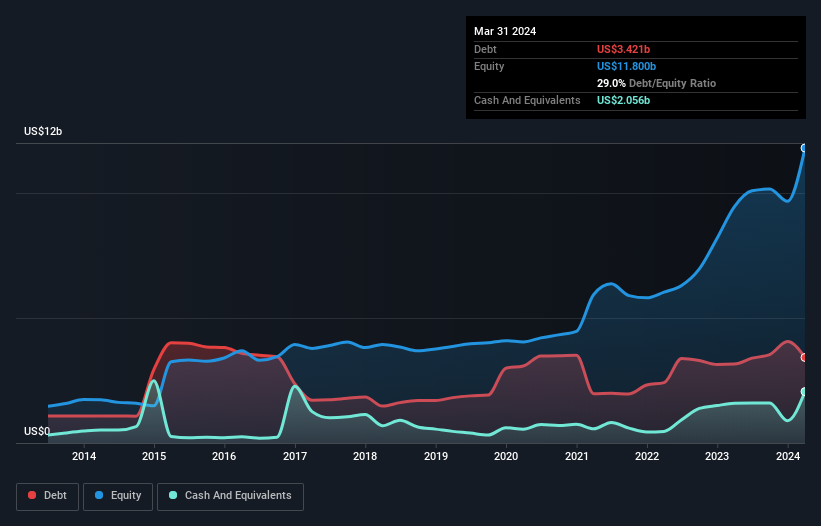
Legendary fund manager Li Lu (who Charlie Munger backed) once said, 'The biggest investment risk is not the volatility of prices, but whether you will suffer a permanent loss of capital.' It's only natural to consider a company's balance sheet when you examine how risky it is, since debt is often involved when a business collapses. Importantly, Albemarle Corporation (NYSE:ALB) does carry debt. But the more important question is: how much risk is that debt creating?
When Is Debt Dangerous?
Debt and other liabilities become risky for a business when it cannot easily fulfill those obligations, either with free cash flow or by raising capital at an attractive price. In the worst case scenario, a company can go bankrupt if it cannot pay its creditors. However, a more frequent (but still costly) occurrence is where a company must issue shares at bargain-basement prices, permanently diluting shareholders, just to shore up its balance sheet. Of course, plenty of companies use debt to fund growth, without any negative consequences. The first thing to do when considering how much debt a business uses is to look at its cash and debt together.
View our latest analysis for Albemarle
What Is Albemarle's Debt?
You can click the graphic below for the historical numbers, but it shows that as of March 2024 Albemarle had US$3.42b of debt, an increase on US$3.16b, over one year. However, it does have US$2.06b in cash offsetting this, leading to net debt of about US$1.37b.

How Healthy Is Albemarle's Balance Sheet?
Zooming in on the latest balance sheet data, we can see that Albemarle had liabilities of US$2.05b due within 12 months and liabilities of US$5.18b due beyond that. Offsetting these obligations, it had cash of US$2.06b as well as receivables valued at US$1.31b due within 12 months. So its liabilities outweigh the sum of its cash and (near-term) receivables by US$3.86b.
While this might seem like a lot, it is not so bad since Albemarle has a huge market capitalization of US$15.0b, and so it could probably strengthen its balance sheet by raising capital if it needed to. However, it is still worthwhile taking a close look at its ability to pay off debt. There's no doubt that we learn most about debt from the balance sheet. But it is future earnings, more than anything, that will determine Albemarle's ability to maintain a healthy balance sheet going forward. So if you're focused on the future you can check out this free report showing analyst profit forecasts.
In the last year Albemarle had a loss before interest and tax, and actually shrunk its revenue by 4.3%, to US$8.4b. That's not what we would hope to see.
Caveat Emptor
Importantly, Albemarle had an earnings before interest and tax (EBIT) loss over the last year. Indeed, it lost US$784m at the EBIT level. Considering that alongside the liabilities mentioned above does not give us much confidence that company should be using so much debt. Quite frankly we think the balance sheet is far from match-fit, although it could be improved with time. However, it doesn't help that it burned through US$1.6b of cash over the last year. So suffice it to say we consider the stock very risky. When analysing debt levels, the balance sheet is the obvious place to start. However, not all investment risk resides within the balance sheet - far from it. These risks can be hard to spot. Every company has them, and we've spotted 2 warning signs for Albemarle you should know about.
If, after all that, you're more interested in a fast growing company with a rock-solid balance sheet, then check out our list of net cash growth stocks without delay.
New: Manage All Your Stock Portfolios in One Place
We've created the ultimate portfolio companion for stock investors, and it's free.
• Connect an unlimited number of Portfolios and see your total in one currency
• Be alerted to new Warning Signs or Risks via email or mobile
• Track the Fair Value of your stocks
Have feedback on this article? Concerned about the content? Get in touch with us directly. Alternatively, email editorial-team (at) simplywallst.com.
This article by Simply Wall St is general in nature. We provide commentary based on historical data and analyst forecasts only using an unbiased methodology and our articles are not intended to be financial advice. It does not constitute a recommendation to buy or sell any stock, and does not take account of your objectives, or your financial situation. We aim to bring you long-term focused analysis driven by fundamental data. Note that our analysis may not factor in the latest price-sensitive company announcements or qualitative material. Simply Wall St has no position in any stocks mentioned.
About NYSE:ALB
Reasonable growth potential with adequate balance sheet.
Similar Companies
Market Insights
Community Narratives




